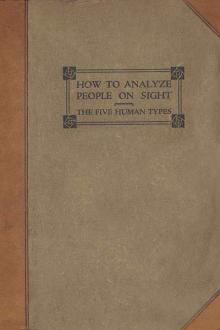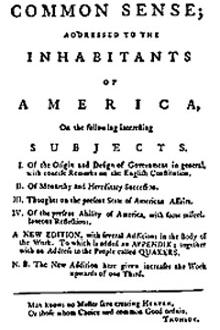How to Analyze People on Sight, Elsie Lincoln Benedict [summer beach reads txt] 📗

- Author: Elsie Lincoln Benedict
- Performer: -
Book online «How to Analyze People on Sight, Elsie Lincoln Benedict [summer beach reads txt] 📗». Author Elsie Lincoln Benedict
He is the most likable of all the types but his indolence sometimes strains even the love of his family to the breaking point.
¶ Feed him, give him comfortable chairs—the largest you have—and don't drag him into long discussions of any kind. This is the recipe for winning the fat man when you meet him socially.
And whatever you do, don't tell him your troubles! The fat man hates trouble, smothers his own, and you only make him ill at ease when you regale him with yours.
Don't walk him any more than is absolutely necessary. Let him go home early if he starts. He enjoys his sleep and doesn't like to have it interfered with.
¶ Make your conversation deal with concrete personal things and events. Stay away from highbrow subjects. The best places to eat and the best shows of the week are safe subjects to introduce when with very fat people.
¶ Don't give him hard manual tasks. If you want this kind of work done get some one other than an extremely fat man to do it. If you hire a fat man blame yourself for the result.
Give your fat employee a chance to deal with people in a not-too-serious way, but hold him strictly to the keeping of his records, reports and working hours. If this fat person is a dealer, a merchant or a tradesman keep him to his word. Start out by letting him know you expect the delivery of just what he promises. Don't let him "jolly" you into relinquishing what is rightfully yours. And keep in mind always that the fat person is usually good at heart.
Remember, the chief distinguishing
marks of the Alimentive in the order
of their importance are ROUNDED
OUTLINES, IMMATURE FEATURES
and DIMPLED HANDS. A person
who has these is largely of the Alimentive
type, no matter what other types
may be included in his makeup.
ndividuals in whom the circulatory system (heart, arteries and blood vessels) and the respiratory system (lungs, nose and chest) are more highly developed than any other systems, have been named the Thoracics.
¶ This name comes from the fact that the heart and lungs (which constitute the most important organs of these two closely-allied systems) are housed in the thorax—that little room made by your ribs for the protection of these vital organs.
¶ A general elasticity of structure, a suggestion of sinews and physical resilience characterizes this type.
¶ What is known as a "red face," when accompanied by a high chest, always signifies large thoracic tendencies. The high color which in an adult comes and goes is a sure indication of a well developed circulatory system, since high color is caused by the rapid pumping of blood to the tiny blood vessels of the face.
People with little blood, weak hearts or deficient circulation are not florid and must be much overheated or excited to show vivid color in their cheeks.
¶ On the other hand, the slightest displeasure, enjoyment, surprise or exertion brings the blood rushing to the face and neck of him who has a large, well-developed blood-system. How many times you have heard such a one say: "I am so embarrassed! I flush at every little thing! How I envy the rest of you who come in from a long walk looking so cool!"
¶ The largest part of this man's body is around the chest. (See Chart 3) His chest is high for the reason that he has larger lungs than the average.
¶ The man of unusual chest-expansion has one great physical asset. The person who breathes deeply has a decided advantage over the man who breathes deficiently. The lungs form the bellows or air-supply for the body's engine, the heart, and with a deficient supply of air the heart does deficient work. Efficient breathing is easy only to the man of large lungs, and only the high chested have large lungs.
¶ A long waist is another thoracic sign, for it is a natural result of the extra house-room required by the large lungs and heart. It is easily detected in both men and women. (See Chart 3)
If you are a close observer you have noticed that some people appear to have a waist line much lower than others; that the belt line dividing the upper part of the body from the lower is proportionately much nearer the floor in some than in others of the same height.
¶ The "straight-up-and-down" lines of today's woman and the slimpsy shoulder-to-heel garments she wears have obliterated her waistline, but you will recall how differently the old "wasp waist" fashions of a score of years ago betrayed the secrets of the short and long waist.
The eighteen-inch belt, of which we were so falsely proud in 1900, told unmistakable facts about milady's thoracic development.
¶ As the tell-tale belt disappeared from woman's wardrobe it appeared in man's, and now betrays the location of his waist with an exactness of which the old-fashioned suspenders were never guilty.
¶ If you are a man and have difficulty in getting ready-made coats long enough for you this is certain proof that you have decided thoracic tendencies. If you are a woman who has to forego many a pretty gown because it is not long enough in the waist, the same is true of you.
In women this long waist and high chest give the appearance of small hips and of shoulders a little broader than the average; in men it gives that straight, soldier-like bearing which makes this type of man admired and gazed after as he strides down the street.
¶ A high head is a significant characteristic of the typical Thoracic. (See Chart 4) The Anglo-Saxons tend to have this head and, more than any other races, exhibit thoracic qualities as racial characteristics.
This is considered the handsomest head known. Certainly it lends the appearance of nobility and intelligence. It is not wide, looked at from the front or back, but inclines to be slightly narrower for its height than the Alimentive head.
¶ A face widest through the cheek bones and tapering slightly up the sides of the forehead and downward to the jaw bones is the face of the pure Thoracic. (See Chart 4) This must not be mistaken for the pointed chin nor the pointed head, but is merely a sloping of the face upward and downward from the cheek bones as a result of the unusual width of the nose section. (See Chart 4)
¶ The nose section is also high and wide because the typical Thoracic has a nose that is well developed. This is shown not only by its length but by its high bridge.
The cause for the width and length of this section is obvious. The nose constitutes the entrance and exit departments of the breathing system. Large lung capacity necessitates a large chamber for the intake and expulsion of air.
¶ Whenever you see a man whose face is wide through the cheek bones—with a long, high-bridged open-nostrilled nose—you see a man of good lung capacity and of quick physical energy. When you see any one with pinched nostrils, a face that is narrow through the cheek bones and a low or "sway-back" nose, you see a man whose lung capacity is deficient. Such a person invariably expends his physical energy more slowly.
Freckles, being due to the same causes as red hair and high color, are further indications of thoracic tendencies, though you may belong to this type with or without them.
¶ The pointed hand is the hand of the pure Thoracic. (See Chart 4) Note the extreme length of the second finger and the pointed effect of this hand when all the fingers are laid together. Any person with a pointed hand such as this has good thoracic development whether it occupies first place in his makeup or not.
The fingers of the Thoracic are also inclined to be more thin-skinned than those of other types.
One may be predominantly Thoracic without these elements but they are indications of the extreme Thoracic type. Naturally the hand of the extreme Thoracic is more pink than the average.
¶ The Thoracic tends to have more narrow, high-arched feet than other types. As a result this type makes the majority of the beautifully shod.
¶ A hair-trigger nimbleness goes with this type. He is always "poised ready to strike."
All Thoracics use their hands, arms, wrists, limbs and feet alertly and energetically. They open doors, handle implements and all kinds of hand instruments with little blundering. Also their movements are more graceful than those of other types.
¶ "The springy step" must have been invented to describe the walk of the Thoracic. No matter how hurried, his walk has more grace than the walk of other types. He does not stumble; and it is seldom that a Thoracic steps on the train of his partner's gown.
¶ The way you sit tells a great deal about your nature. One of the first secrets it betrays is whether you are by nature graceful or ungainly. The person who sits gracefully, who seems to drape himself becomingly upon a chair and to arise from it with ease is usually a Thoracic.
Their excess of energy sometimes gives them the appearance of "fidgeting," but it is an easy, graceful fidget and not as disturbing as that of other types.
¶ Quick eyes and keen ears are characteristic of the Thoracics. The millions of stimuli—the sounds, sights and smells impinging every waking moment upon the human consciousness—affect him more quickly and more intensely than any other type. The acuteness of all our senses depends, to a far greater extent than we have hitherto supposed, upon proper heart and lung action.
Take long, deep breaths for five minutes in the open air while walking rapidly enough to make your heart pound, and see how much keener your senses are at the end of that time.
The Thoracic is chronically in this condition because his heart and lungs are going at top speed habitually and naturally all his life.
¶ Because bodily temperature varies according to the amount of blood and the rapidity of its circulation, this type is always warmer than others. He is extremely susceptible to heat, suffers keenly in warm rooms or warm weather and wears fewer wraps in winter. The majority of bathers at the beaches in summer are largely of this type.
¶ Nerves as taut as a violin string—due to his acute physical senses and his thin, sensitive skin—plus his instantaneous quickness make the Thoracic what is known as "high-strung."
¶ Because he is keyed to high C by nature, the Thoracic has more of that quality called temperament than any other type.
The wag who said that "temperament was mostly temper" might have reversed it and still have been right. For temper is largely a matter of temperament. Since the Thoracics have more "temperament" it follows naturally that they have more temper, or rather that they show it oftener, just as they show their delightful qualities oftener.
¶ This type, consciously and unconsciously, is a "continuous





Comments (0)